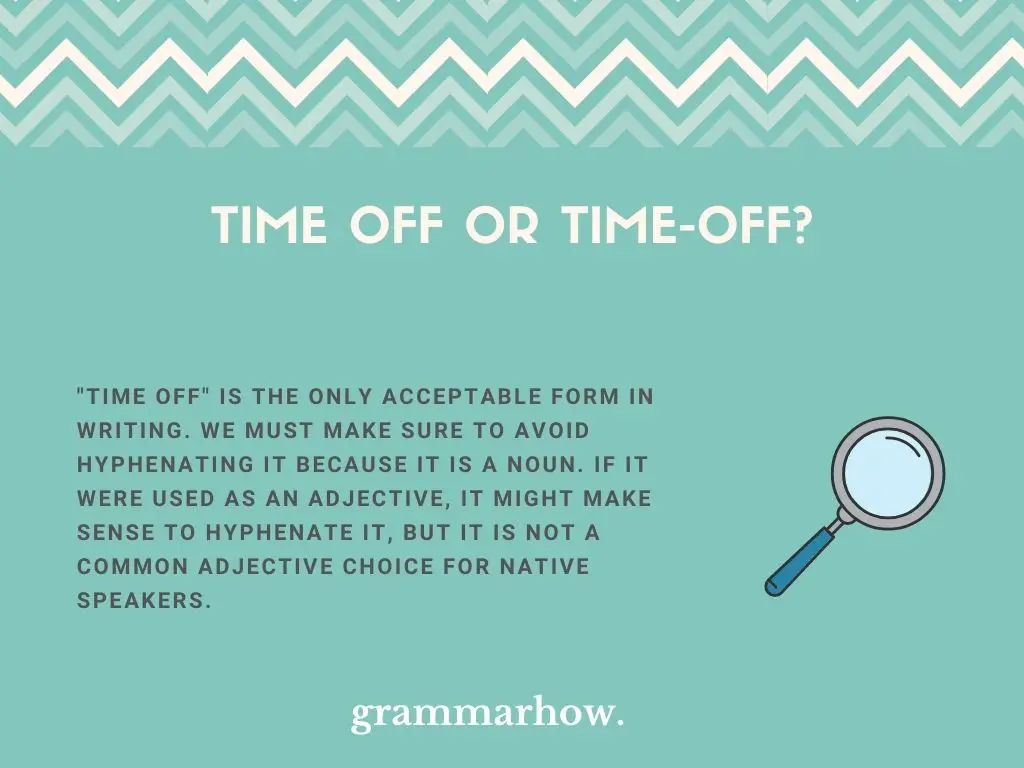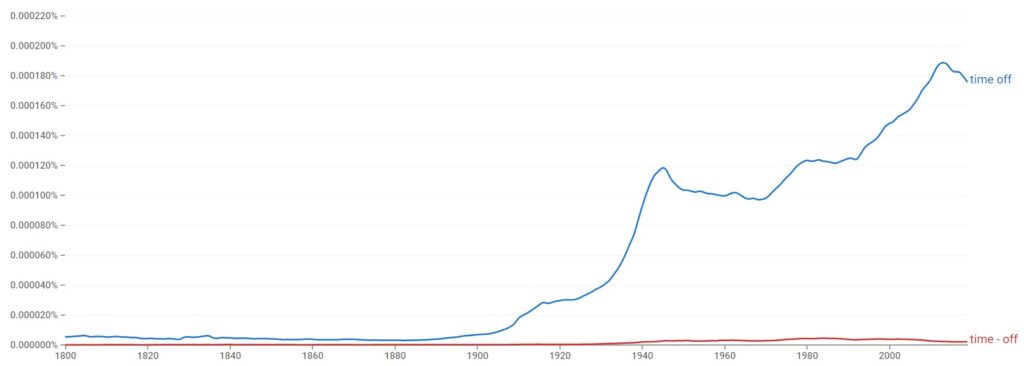It’s always a joy to have some time off (especially if you work a busy life). That’s why it’s important to know how to spell it. We will help you understand whether it’s one or two words. Some people think it’s hyphenated in some cases, so let’s take a look.
Time off vs. Time-off
“Time off” is the only acceptable form in writing. We must make sure to avoid hyphenating it because it is a noun. If it were used as an adjective, it might make sense to hyphenate it, but it is not a common adjective choice for native speakers.

According to Google Ngram Viewer, “time off” is vastly more popular than the hyphenated version. From these results, it’s clear that you should never hyphenate “time off” because it is a noun rather than an adjective.

The Cambridge Dictionary and The Oxford Dictionary note that “time off” is only correct when it is not hyphenated. Both dictionaries note that it is a mass noun or phrasal noun, which is used to talk about taking time away from work.
There is no mention of the hyphenated form, which shows that it’s not officially recognized.
Time off
“Time off” works when it is unhyphenated because it is a mass noun. We use it without any other modifications taking place, which means it should not be hyphenated. Instead, “time” and “off” should modify each other to show that we get time away from work.
It is only ever a noun form, which is why it’s important to remember that the hyphen is not required.
The rules around hyphenating nouns depend mainly on the preference for native speakers. Since the graph above proved that “time-off” isn’t used, it shows that there is no preference for the hyphenated noun form.
Here are a couple of great examples to help explain the correct phrasing:
- If you’d like some more time off, you only have to ask! I’m feeling very generous, after all.
- I thought he had his time off booked already! Now I feel like an idiot for taking that for granted.
- Stop booking time off for a few weeks! I need you to work close to me to make sure you know what you’re doing.
- Time off will not be acceptable for the next few months! I simply cannot find a way to rejig the rotas right now!
Time-off
“Time-off” is not correct when hyphenated. We only use it as a noun, so it does not modify anything else in a sentence. It will only work in its hyphenated form if it modifies another noun. Since this is not possible, we can avoid using the hyphen form.
We can usually refer to the AP Stylebook when learning about hyphens. However, AP Style teaches us how to hyphenate adjectives rather than nouns. It does allow us to hyphenate compound nouns when they’re commonly written together, but this doesn’t always apply to “time off.”
Therefore, we cannot use AP Style rules to hyphenate “time-off.” There is simply no reason to hyphenate the phrasal noun in any case.
These examples will remind you of the correct form:
- Correct: I’m going to book some time off over the coming weeks because I really think I need it!
- Incorrect: I’m sorry, but I can’t grant you any more time-off! You’ve already had as much as I can offer this year!
- Correct: Time off is not acceptable at this time! We cannot afford to let any workers go at such busy hours.
- Incorrect: Your request for time-off has been granted! Thank you for getting it to me so swiftly!
Is “Off” Capitalized In The Word “Time-Off”?
At this point, we usually go over how to capitalize hyphenated words. However, since “time-off” is not grammatically correct, we didn’t think there was much point in teaching you how to capitalize it.
Going back to the correct two-word variation of “time off,” you need not worry about capitalization. It is not a proper noun, so you do not capitalize either of the words.
You might choose to capitalize them if they’re included in your title (if you think it suits the rest of your title style). Of course, when you start a sentence with it, then “time” should also be capitalized. Other than that, don’t worry!

Martin holds a Master’s degree in Finance and International Business. He has six years of experience in professional communication with clients, executives, and colleagues. Furthermore, he has teaching experience from Aarhus University. Martin has been featured as an expert in communication and teaching on Forbes and Shopify. Read more about Martin here.
